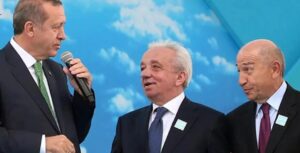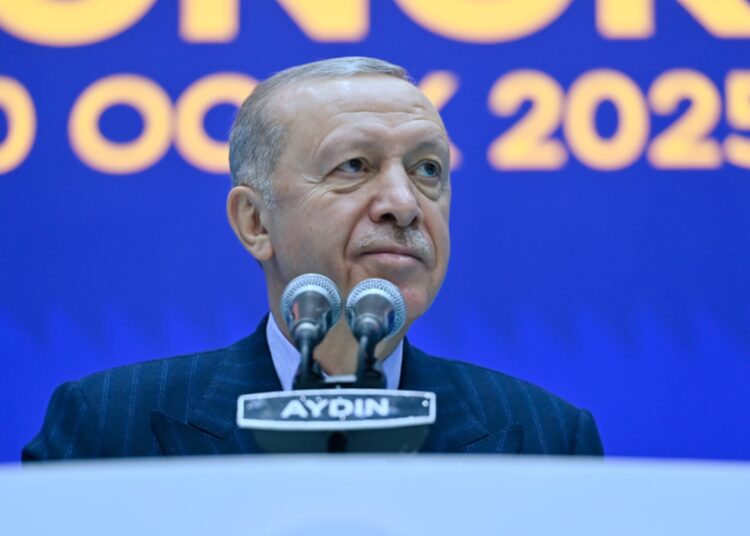Abdullah Bozkurt/Stockholm
A Turkish cabinet official has justified a recent decision to classify data on state subsidies to Turkish businesses, framing it as a strategic move to prepare the country for potential trade wars and safeguard it against retaliatory measures.
“Global trade protectionism has surged, culminating in what is widely referred to as trade wars,” wrote Mehmet Fatih Kacır, Turkey’s minister of technology and industry, in a letter to parliament on December 12, 2024, a copy of which was obtained by Nordic Monitor.
He emphasized that publicly disclosing detailed data on state subsidies could jeopardize Turkey’s trade interests, potentially prompting importing countries to impose trade barriers on Turkish products.
On November 10, 2024 Turkish President Recep Tayyip Erdogan issued Executive Order No. 9124, introducing amendments to the framework for providing project-based state assistance to investments in Turkey. The decision was published in the Official Gazette the following day.
The decree drew little public attention and was perceived as a mere technical adjustment or a minor amendment. However, in reality, it marked a significant alteration to the 2016 Cabinet decision on state subsidies. The change stipulates that decisions to support specific projects will no longer be disclosed publicly, effectively classifying Investment Incentive Certificates (Yatırım Teşvik Belgesi, or YTBs in Turkish) issued by the Ministry of Industry and Technology as confidential.
Copy of the presidential decree mandating the cessation of the publication of data on state subsidies provided to Turkish companies by the government:
The true motivation behind the presidential decree was revealed a month later in a letter written by Turkey’s minister of technology and industry. “The sharing of specific investment-related data on a company basis can negatively affect the competitiveness of firms and result in challenges in the countries they export to,” Kacır said in the letter. He warned that countries importing Turkish products could access this data and potentially implement countervailing measures to undermine Turkish exports.
There were already indications that the government was intent on withholding data on YTBs from the public. While the data was meant to be released monthly, the Ministry of Industry and Technology ceased this practice in March 2023, instead opting to share bulk data covering several months at a time. With the recent amendment, the government is now under no obligation to release any data on YTBs, effectively making the process entirely opaque.
The YTB has been extensively utilized in Turkey to provide a range of financial, tax and operational benefits designed to encourage investment and stimulate economic growth. These incentives are customized based on the type, size and location of the investment, offering significant advantages for businesses.
Among the benefits are exemptions from duty and value-added tax on machinery, reductions in corporate and income taxes, low-interest loans, subsidies for workers’ social security and insurance contributions, land allocation and more.

The YTB not only alleviates the financial burden of establishing or expanding a business but also enhances its long-term profitability. By leveraging the various incentives available, investors can reduce costs, become more competitive in export markets and benefit from government support aimed at fostering growth.
According to an announcement by President Erdogan on December 31, 2024, the government issued 1,439 investment incentive certificates for the year, which are expected to lead to the creation of over 250,000 additional jobs.
The YTBs undoubtedly enhance the competitiveness of Turkish products in international markets by reducing production costs, making Turkish goods more affordable for export. This, in turn, helps Turkey expand its market share abroad.
Turkey’s trade partners, however, are well aware of this strategic practice and can easily identify businesses and sectors benefiting from state subsidies. The publication of YTBs serves as evidence that justifies the imposition of countervailing measures, such as higher tariffs on Turkish products, to counterbalance the advantages granted by the Turkish government.
As a result, the competitive advantage gained through the YTBs could be eroded since the cost savings from the incentives might not outweigh the additional tariff burden imposed on businesses or sectors by countries that import Turkish goods.
By withholding data on YTBs, the Erdogan government aims to prevent other countries from taking retaliatory actions designed to restore fair trade and enable competition with Turkish products on an equal footing.
Letter from Mehmet Fatih Kacır, Turkey’s minister of technology and industry, reveals that Turkey is preparing for trade wars by providing secret state subsidies to businesses:
Countries may also impose anti-dumping tariffs on Turkish products if they perceive that the incentives provided by YTBs distort fair competition. If a Turkish product is sold at an unusually low price in international markets due to the benefits of YTBs, the importing country might view this as dumping — selling below market value. In such cases, anti-dumping tariffs could be imposed to protect domestic industries from unfair competition.
While the Erdogan government may view concealing YTB data as a strategic move to hide state subsidies and avoid retaliatory tariffs or trade disputes in global markets, this approach could backfire, potentially provoking a backlash across industries that export products abroad. In the absence of specific data, Turkey’s trade partners may adopt broader countermeasures, targeting more businesses based on mere suspicions. This could be done to counteract perceived efforts to dump Turkish products in international markets, thereby escalating tensions and harming Turkey’s global trade relations.
In other words, industries such as automotive, electronics, machinery and textiles — sectors on which Turkey relies for generating export revenue — may face higher tariffs in key markets. These tariffs could offset the benefits of domestic incentives, leading to a potential decline in demand for Turkish goods abroad. Ultimately, the imposition of trade tariffs could diminish the profitability of Turkish companies, even if they continue to benefit from domestic incentives.
Turkey also risks significant trade disputes with the European Union, its primary export market. To avoid challenges or retaliatory tariffs, YTBs must comply with the EU’s strict state aid regulations. Additionally, Turkey may face an increase in unfair trade practice disputes at the World Trade Organization (WTO) due to the covert use of YTBs to support Turkish exports, potentially exacerbating tensions in global trade.

The handling of YTBs in Turkey has also faced domestic criticism. More often than not, incentives have been seen to favor businesses or individuals with political connections, particularly those close to President Erdogan’s ruling Justice and Development Party (AKP) and its key far-right ally, the Nationalist Movement Party (MHP). This has raised concerns about the fairness and transparency of the distribution of state subsidies.
There have been numerous instances where businesses received incentives but failed to deliver on promised outcomes, such as job creation or infrastructure development. However, these businesses faced no repercussions as they were shielded by the government. The monitoring and enforcement mechanisms designed to ensure compliance with incentive criteria have proven ineffective, particularly when it comes to politically connected businesspeople. This lack of accountability has raised concerns about the fairness and transparency of the system.
The Erdogan government has also been accused of prioritizing short-term gains, such as job creation at the outset of projects funded by subsidies, rather than focusing on long-term, sustainable growth. This approach is seen as a strategy to present immediate successes during election campaigns rather than fostering enduring economic development.
The opposition in Turkey has also criticized the government for concentrating on specific sectors, such as construction and real estate, leading to overinvestment over the past two decades. The practice has significantly contributed to the personal enrichment of President Erdogan and his associates, who have received kickbacks and bribes from multi-billion dollar projects. Critics argue that this focus on particular industries has distorted economic priorities and exacerbated corruption within the system.
For example, between 2010 and 2024, five construction contractors — Cengiz, Kolin, Limak, Makyol and Kalyon — received the bulk of state subsidies in the form of tax exemptions, according to official data. President Erdogan is reportedly a silent partner or the true owner of some of these companies, as revealed by corruption investigations in 2013. The substantial payouts in state subsidies to these companies have raised serious concerns about conflicts of interest and the potential misuse of public resources.
As a result, fewer incentives were allocated to critical sectors such as technology, research and development, innovation, education and renewable energy — industries essential for the country’s long-term economic growth. The inefficient allocation of resources has meant that support is often directed toward industries or projects that may not yield the highest economic or social returns but are favored by the government. This has hindered the development of sectors crucial for Turkey’s future sustainability and competitiveness.
While Turkey requires greater transparency to address ongoing issues in its state subsidy programs, the Erdogan government has taken a further step backward by making data on state subsidies secret. In doing so, President Erdogan not only seeks to deceive Turkey’s trading partners but also to protect his business allies, who unfairly benefit from state assistance at the expense of taxpayers. This move exacerbates concerns about corruption and the misuse of public funds.












